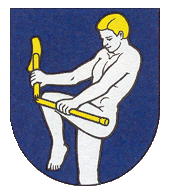Piešťany: Difference between revisions
Knorrepoes (talk | contribs) m (Text replace - "|width="15%"|50 px|right |}" to "|width="15%"|50 px|right |}|}<seo title="Erby Slovenska, Erby Slovenských miest a obcí" />") |
Knorrepoes (talk | contribs) m (Text replace - "|}|}<" to "|}<") |
||
| Line 3: | Line 3: | ||
|width="70%" align="center" |'''Heraldry of the World<br/>Civic heraldry of [[Slovakia]] (Slovenská Heraldika Miest a Obcí)''' | |width="70%" align="center" |'''Heraldry of the World<br/>Civic heraldry of [[Slovakia]] (Slovenská Heraldika Miest a Obcí)''' | ||
|width="15%"|[[File:Slovakia.jpg|50 px|right]] | |width="15%"|[[File:Slovakia.jpg|50 px|right]] | ||
|}<seo title="Erby Slovenska, Erby Slovenských miest a obcí" /> | |||
'''PIEŠŤANY''' | '''PIEŠŤANY''' | ||
Revision as of 07:41, 9 November 2012
| Heraldry of the World Civic heraldry of Slovakia (Slovenská Heraldika Miest a Obcí) |
PIEŠŤANY
Province : Trnava
District (okres) : Piešťany
Official blazon
Origin/meaning
The arms of the city of Piešťany show a naked man with golden hair, turned to the right side and breaking a golden crutch, held by his both hands, over his left knee. "The Crutch-breaker" as it is locally known, symbolises recovery due to the healing capacities of the local spa and was created by Arthur Heyer in 1897, at that time 27-yrs old painter. He created it for the advertising purposes at the request of the then spa owner Ludovit Winter. Originally this symbol was used exclusively by the spa, but it became the part of the city arms on October 21, 1945 when the village of Piešťany was promoted to the rank of city. Previously the village used a seal with the emblem of king Stefan the local patron saint. The oldest evidence of this seal dates from 1564.
The best-known representation of "The Crutch-breaker" is the sculpture by Robert Kühmayer from 1933 standing on the bridge that connects city center with the spa.
Literature : Kartous and Vrteľ , 2000; Martin Hlauka

